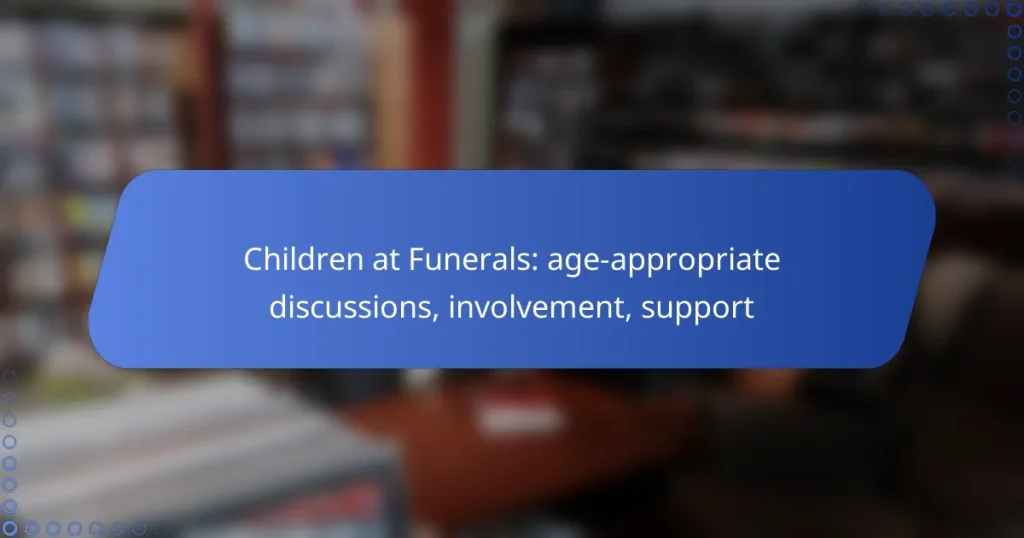Discussing death and involving children in funerals can be a vital part of their emotional development and understanding of grief. By engaging them in age-appropriate conversations and activities, families can help children process their feelings and feel supported during a challenging time. Providing access to resources and open dialogue fosters a healthy environment for children to navigate their emotions surrounding loss.
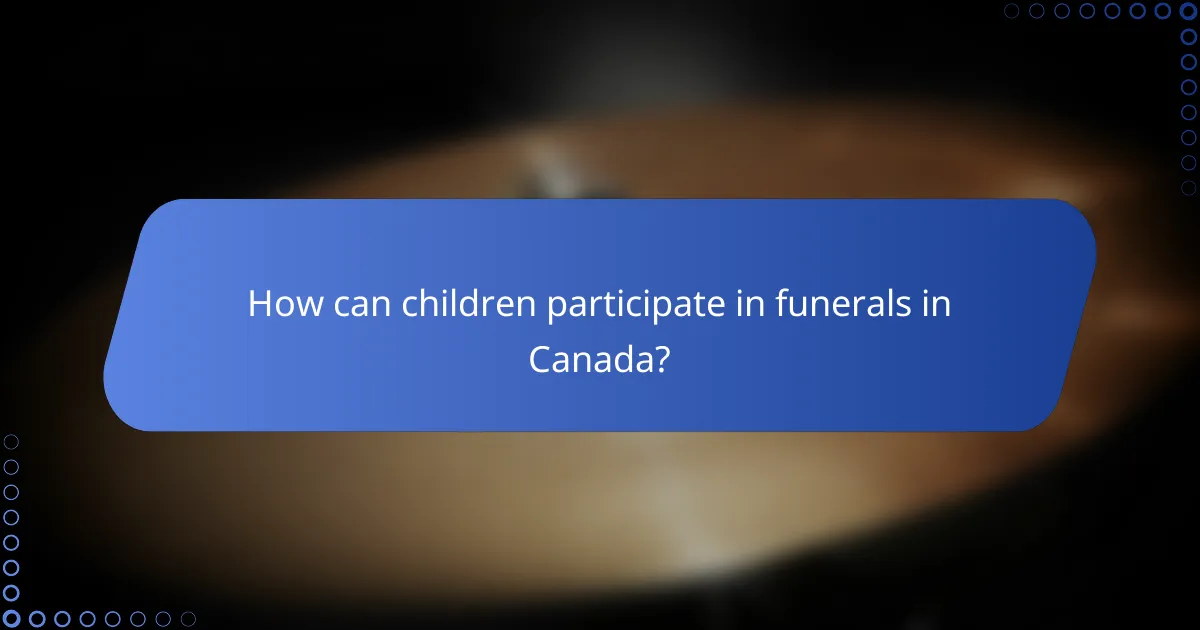
How can children participate in funerals in Canada?
In Canada, children can participate in funerals in meaningful ways that are appropriate for their age and emotional maturity. Involvement can help them process grief and feel included in the family’s support system during a difficult time.
Age-appropriate roles
Children can take on various roles at funerals, depending on their age. Younger children might help with simple tasks, such as placing flowers or lighting candles, while older children can participate in readings or share memories. It’s essential to gauge their comfort level and readiness for each role.
Parents should encourage children to express their feelings about participating. Open discussions can help determine what tasks they feel comfortable with and whether they want to be involved in the ceremony or prefer to stay with family members during the service.
Creative involvement options
Creative options for children to participate include drawing pictures, writing letters to the deceased, or creating memory boxes. These activities allow children to express their emotions and can be shared during the service or kept as personal mementos.
Another option is to involve children in planning a small tribute, such as selecting music or choosing readings that resonate with them. This can empower children and make them feel more connected to the event.
Support from funeral professionals
Funeral professionals in Canada are often trained to support families with children during services. They can provide guidance on how to involve children appropriately and can suggest age-appropriate activities that help children cope with grief.
Families should feel comfortable discussing their needs with funeral directors, who can offer resources such as grief counseling or materials specifically designed for children. This support can help ensure that the funeral experience is respectful and sensitive to the needs of younger attendees.
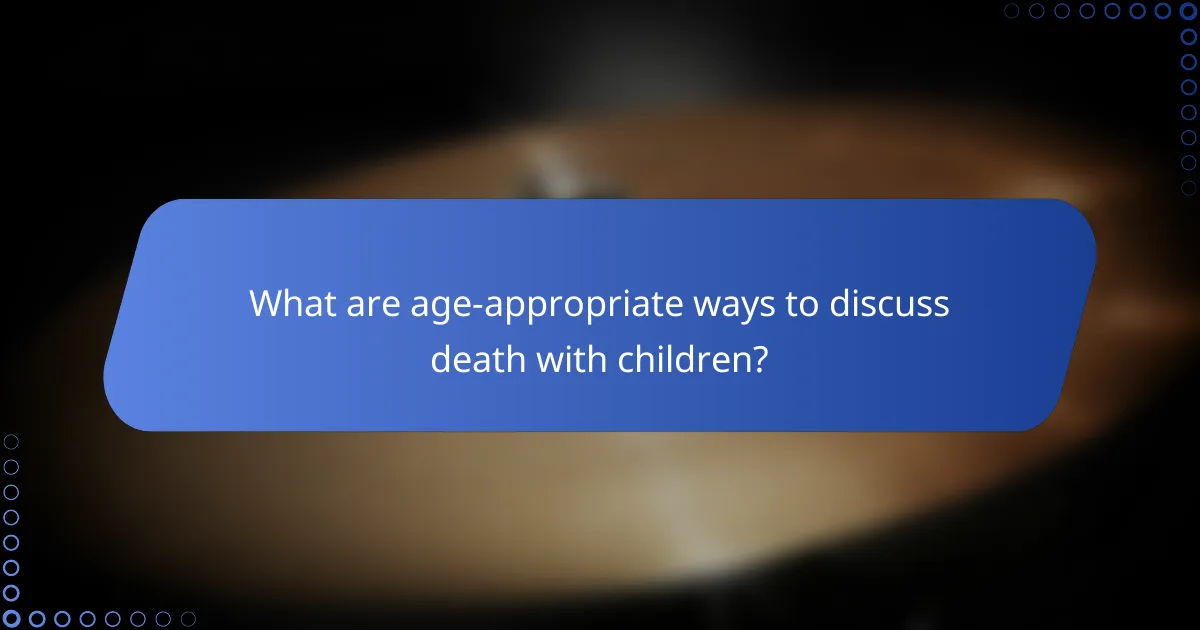
What are age-appropriate ways to discuss death with children?
Age-appropriate discussions about death with children involve using clear language, encouraging open dialogue, and providing supportive resources. Tailoring the conversation to the child’s developmental stage helps them understand and process the concept of loss effectively.
Using simple language
When discussing death with children, it’s crucial to use straightforward and age-appropriate language. Avoid euphemisms like “passed away” or “gone to sleep,” as these can confuse young minds. Instead, use direct terms such as “died” and explain what that means in simple terms.
For younger children, focus on concrete concepts. For example, explain that death means the person will not come back and that their body has stopped working. This clarity helps children grasp the reality of the situation without unnecessary complexity.
Encouraging questions
Encouraging children to ask questions about death can help them process their feelings and thoughts. Create a safe space for them to express their curiosities and concerns. Respond to their inquiries honestly, while keeping your explanations appropriate for their age.
Be prepared for a range of questions, from the straightforward to the more complex. Children may ask about what happens after death or why it happens. Answer these questions as simply as possible, and reassure them that it’s okay to feel sad or confused.
Books for children on grief
Books can be a valuable tool in helping children understand and cope with grief. Look for age-appropriate literature that addresses loss in a gentle and relatable way. Titles like “The Fall of Freddie the Leaf” or “I Miss You: A First Look at Death” can provide comfort and insight.
Reading together can also open up discussions about feelings and memories related to the deceased. Encourage children to express their emotions and thoughts about the story, which can help them articulate their own experiences with grief.
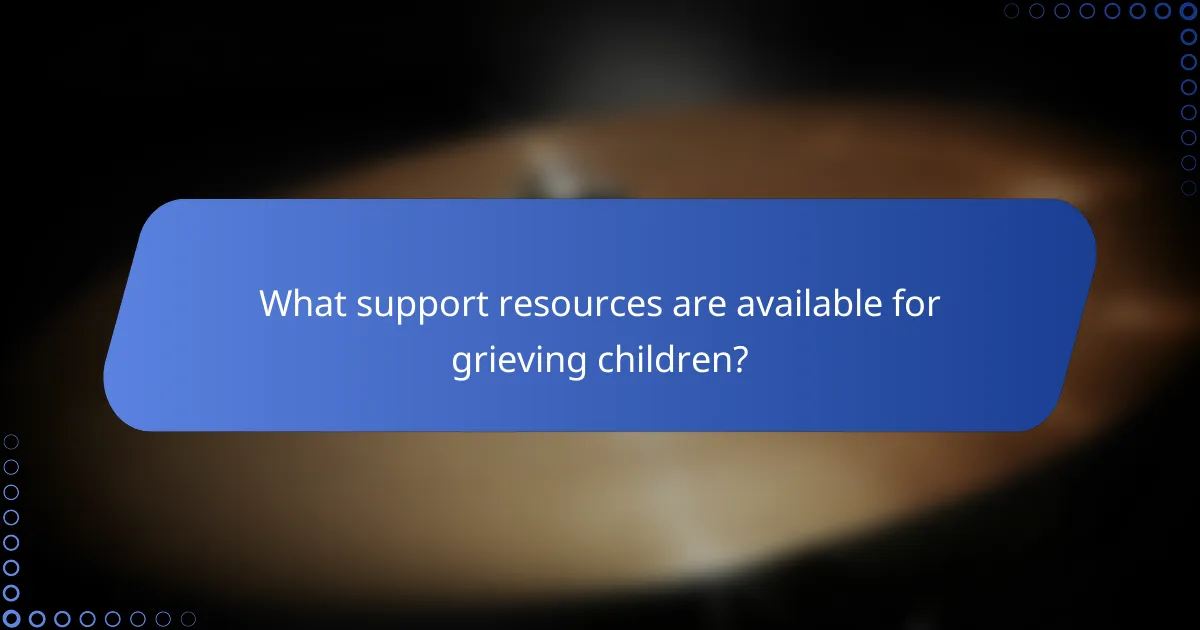
What support resources are available for grieving children?
Grieving children can benefit from various support resources designed to help them process their emotions and experiences. These resources include local grief counseling services, online support groups, and educational materials tailored for parents.
Local grief counseling services
Local grief counseling services provide face-to-face support for children dealing with loss. These services often include individual or group therapy sessions led by trained professionals who specialize in childhood grief.
Many communities offer programs specifically for children, allowing them to express their feelings in a safe environment. It’s beneficial to research nearby options, as some may be free or covered by health insurance.
Online support groups
Online support groups can offer grieving children a sense of connection and understanding from peers who are experiencing similar feelings. These platforms often provide moderated discussions and resources that cater to different age groups.
Parents should ensure that any online group is safe and age-appropriate, as well as check the credentials of the moderators. Websites like GriefShare and The Dougy Center offer valuable resources and community support for families.
Educational materials for parents
Educational materials for parents can guide them in supporting their grieving children effectively. Books, articles, and workshops can provide insights into age-appropriate discussions about death and loss.
Parents may find it helpful to look for resources that offer practical advice on how to communicate with children about grief, including recommended reading lists and activities that can facilitate open conversations.
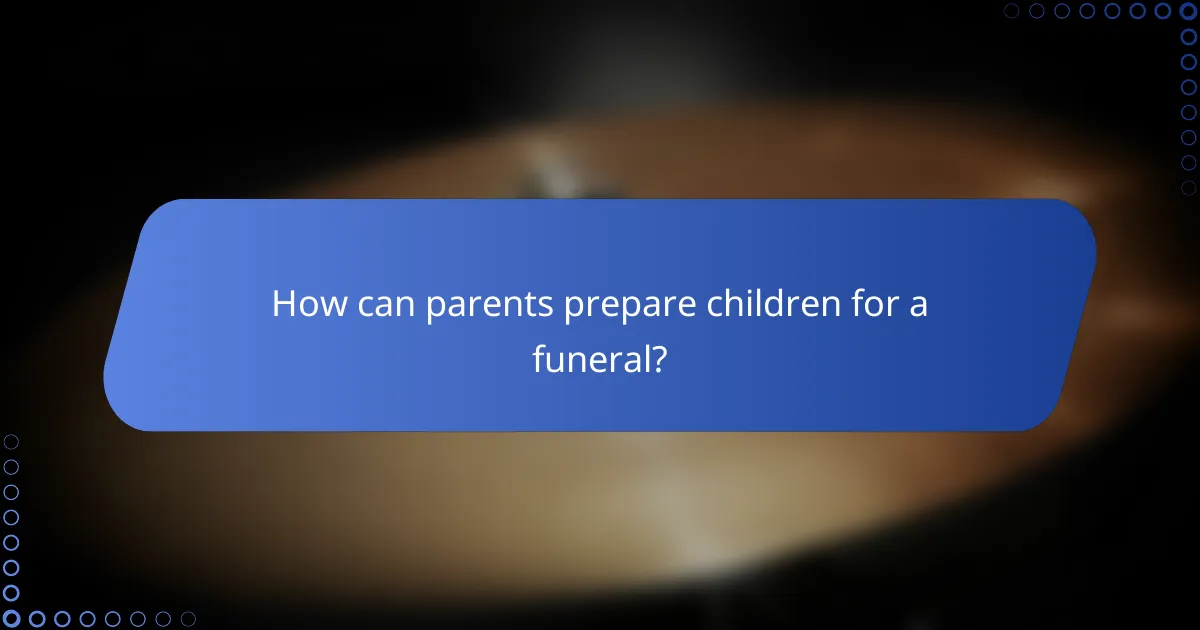
How can parents prepare children for a funeral?
Parents can prepare children for a funeral by discussing what to expect and involving them in the process. This helps children understand the significance of the event and feel more comfortable during the experience.
Discussing expectations
Talking openly about what a funeral entails is crucial for children. Explain the purpose of the gathering, the emotions they might encounter, and the behaviors that are generally expected, such as being respectful and quiet. Use age-appropriate language to ensure they grasp the concept without becoming overwhelmed.
Encourage children to express their feelings and ask questions. This dialogue can help demystify the experience and allow them to process their emotions in a supportive environment.
Visiting the venue beforehand
If possible, take your child to the funeral venue before the actual event. Familiarizing them with the space can reduce anxiety and help them feel more at ease. Point out key areas, such as where the service will take place and where they can sit.
During the visit, discuss what they might see, such as flowers, photographs, or people they may know. This preparation can help them feel more in control and less surprised on the day of the funeral.
Role-playing scenarios
Role-playing can be an effective way to prepare children for a funeral. Create scenarios that they might encounter, such as greeting family members or expressing their feelings. This practice can help them develop appropriate responses and understand social cues.
Encourage them to express their emotions during these role-plays, reinforcing that it’s okay to feel sad or confused. This approach can build their confidence and help them navigate the actual event more comfortably.
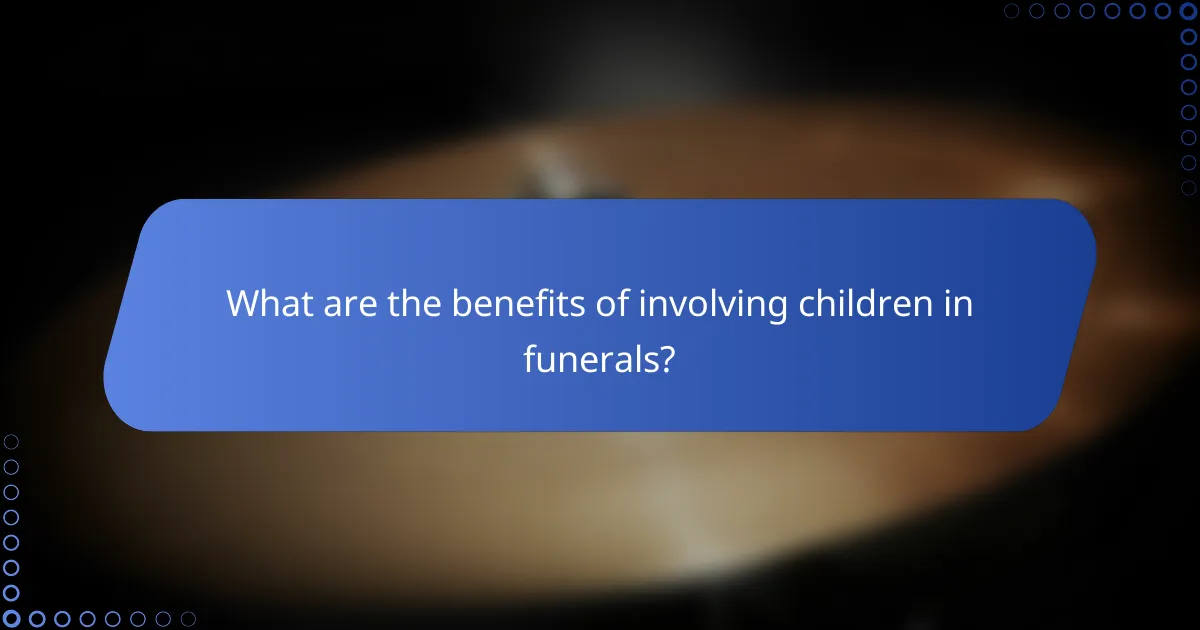
What are the benefits of involving children in funerals?
Involving children in funerals can provide them with a sense of closure, help them understand the grieving process, and strengthen family bonds. Engaging children in this experience can foster emotional resilience and facilitate open conversations about loss.
Emotional closure
Children who participate in funerals often find it easier to process their emotions related to loss. Being part of the ceremony allows them to say goodbye and express their feelings in a supportive environment. This involvement can lead to a healthier emotional adjustment over time.
To facilitate emotional closure, consider allowing children to contribute in ways that feel comfortable for them, such as drawing a picture for the deceased or lighting a candle during the service. These small acts can make a significant difference in their grieving journey.
Understanding the grieving process
Involving children in funerals helps them grasp the concept of death and the accompanying emotions. It provides an opportunity for them to learn about grief in a real context, which can demystify the experience and reduce feelings of confusion or fear.
Encourage discussions about what they observe during the funeral, as this can help clarify their thoughts and feelings. Use age-appropriate language to explain the rituals and significance of the event, ensuring they feel informed and included.
Building family connections
Funerals can serve as a gathering point for families, allowing children to connect with relatives and share memories of the deceased. This shared experience can strengthen family ties and create a support network for children during difficult times.
To enhance these connections, consider involving extended family members in conversations with children about their memories and feelings. This can foster a sense of belonging and remind children that they are not alone in their grief.
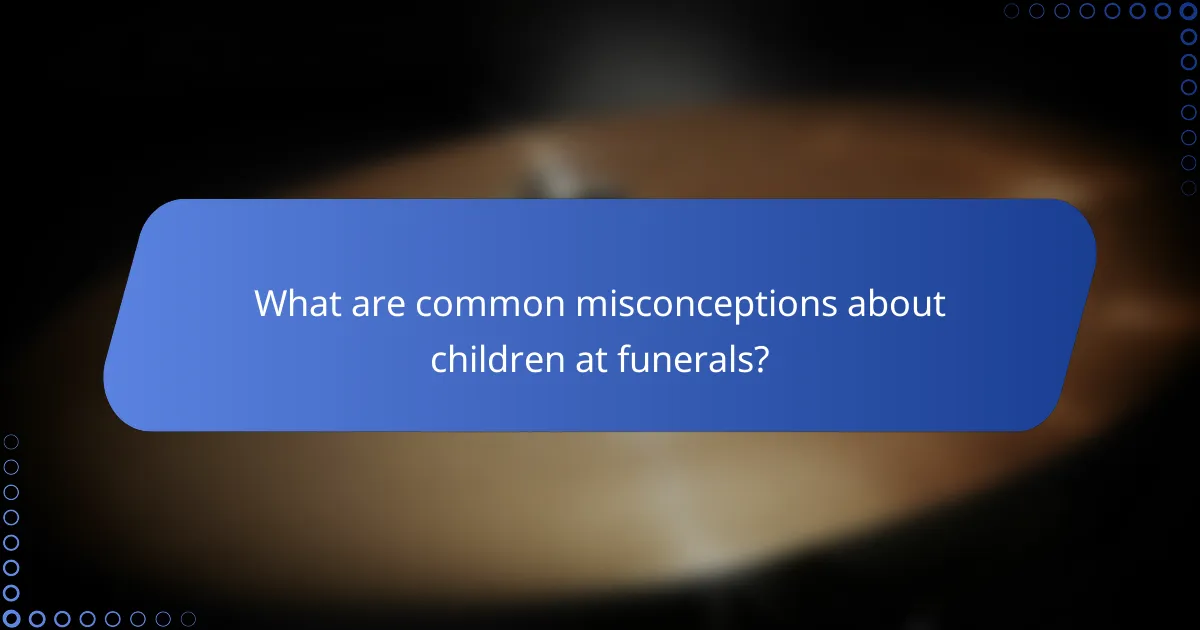
What are common misconceptions about children at funerals?
Common misconceptions about children at funerals include the belief that they should not attend and the assumption that they will not understand the situation. These misunderstandings can hinder healthy grieving processes and limit children’s opportunities to express their emotions.
Belief that children shouldn’t attend
Many adults think that funerals are too somber or complex for children, leading to the belief that they should be kept away. However, excluding children can prevent them from processing their grief and understanding the reality of loss. Involving them can help foster a sense of closure and belonging.
When deciding whether a child should attend, consider their age, maturity level, and relationship to the deceased. If a child expresses a desire to attend, it can be beneficial to allow them to participate, even if only for part of the service.
Assuming children won’t understand
It is a common assumption that children lack the capacity to grasp the concept of death, but many can understand it at varying levels depending on their age. Younger children may perceive death as temporary, while older children can comprehend its permanence. Tailoring explanations to their developmental stage is crucial.
Providing simple, honest answers to their questions can help children process their feelings. For instance, using clear language about what death means and why funerals are held can demystify the experience. Encouraging them to share their thoughts and feelings can also facilitate understanding and emotional expression.
